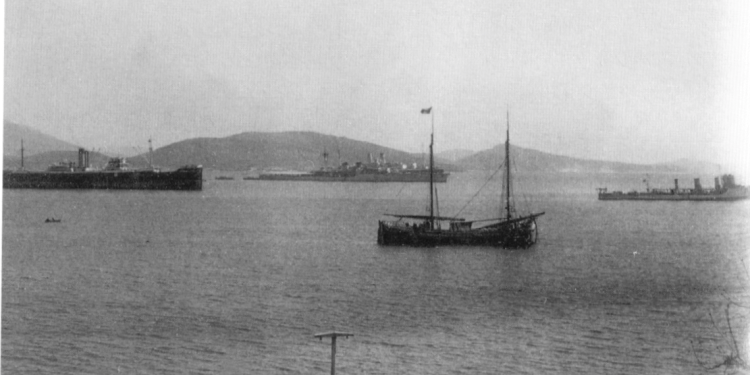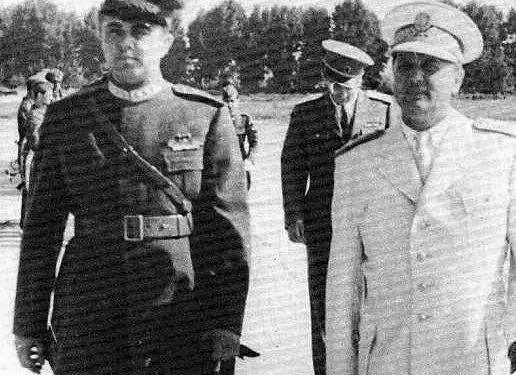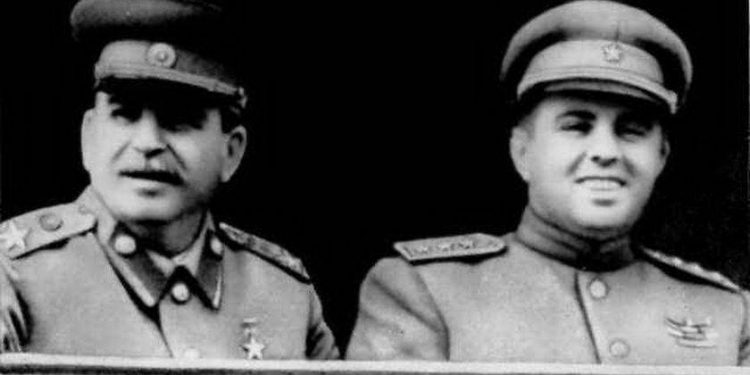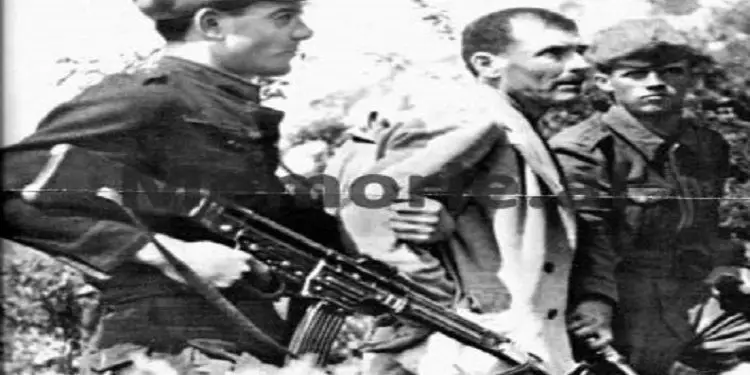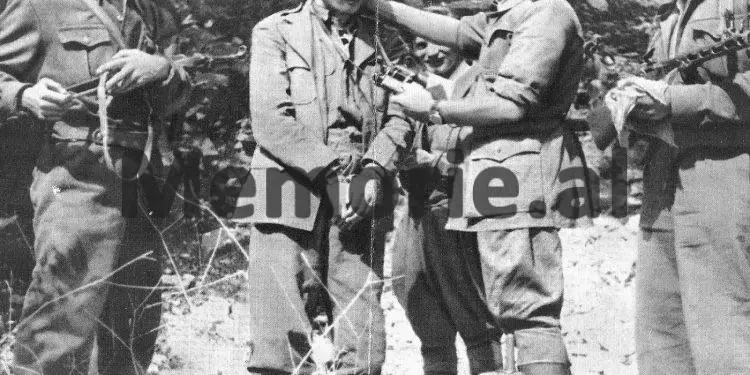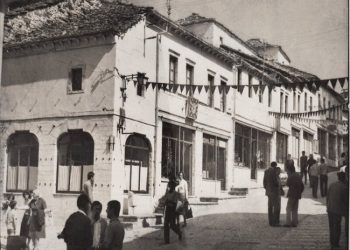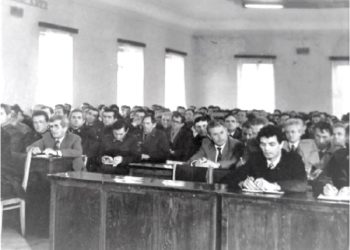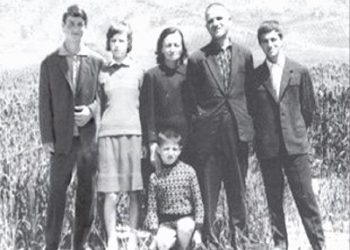By Aida Harka
Memorie.al / In the secret CIA report of November 15, 1951, it is revealed that the two main leaders of the communist regime, Enver Hoxha and the Minister of the Interior, Mehmet Shehu, had a constant control from the Kremlin. According to the report in question, Hoxha and Shehu were able to rule the country through the usual communist methods of police terror and rigid economic policies. For more about this, etc., see the CIA report, which we are publishing below in this article.
CIA Report on the Situation in Enver Hoxha’s Albania
“Politically, Albania is important to the Soviet Union, as it was considered a bastion of communism. The Soviet Union would consider its loss a blow to the Soviet camp, especially after Yugoslavia’s departure from the camp and the failure of the communist efforts in Greece. Economically, Albania is totally dependent on the Soviet Union. While militarily, Albania is of lesser importance to the Soviet Union, although it has a strategic position at the entrance to the Adriatic Sea under modern conditions, its military capabilities are limited.
The island of Sazan and the port of Vlora have potential value as a base for maintaining ships, submarines, etc. The island of Sazan was a small Italian submarine base, while it is said, but this is not confirmed, that in the first years after the war, the Soviets began to rebuild these facilities. Since the breakup with Yugoslavia, Albania has lost much of its strategic importance due to the lack of land connection with the Soviet bloc. However, Albania would be important for the fighting in the Balkans. If a joint operation with Bulgaria were successful, then this would separate Greece from Yugoslavia.
THE SITUATION IN ALBANIA
Until Yugoslavia’s break with the Cominform in 1948, Albania was closely linked, both politically and economically, to the Tito government. Under these conditions, Hoxha, instead of following Marshal Tito’s heresy, chose the Soviet camp and began a feverish campaign to eliminate “nationalist” elements in Albania. Hoxha not only severed all ties with Yugoslavia, but also succeeded in eliminating serious competition for leadership within the country. Even the rivalry that is said to exist between Hoxha and the Minister of the Interior, Mehmet Shehu, does not appear dangerous, since both are totally controlled by Kremlin.
With Soviet support, Hoxha and Shehu have so far been able to rule the country, through the usual communist methods of police terror and rigid economic policies. Soviet support for Albania does not include a pact of mutual assistance, perhaps because the Soviet Union wants to leave things unclear, as well as to avoid certain obligations that Albania would never fulfill.
However, any change in the Albanian situation that could threaten Soviet control would automatically pose a problem for Soviet prestige in an area where one of the satellites (Yugoslavia) has already challenged the Kremlin. Under these circumstances, such a change would probably only occur with the support of one or more neighboring states. Such a development would necessarily lead to a deterioration of the international situation.
RESISTANCE TO THE CURRENT REGIME
There is some discontent among Albanians and as a result there have been visible signs of resistance in recent years. The Albanian authorities themselves have acknowledged the existence of subversive elements and attacks on military facilities. The most dramatic incident of resistance activity was the bombing of the Soviet embassy in February 1951. But the assassinations of local officials, as well as economic sabotage, have been the most effective challenge to communist authority. So far, Hoxha’s regime has faced opposition movements, increasing repressive measures.
For example: Shehu has organized special punitive battalions, which operate in mountainous areas against resistance groups. According to data reported by political refugees in Albania, there are several local resistance groups such as: “National League of the Mountains”, “Liberty”, “Skënderbeu”, “Kushtrimi”, “Bashkimi kombëtar”, but there is no specific information about these groups. There is also no evidence of any possible cooperation between dissident groups, despite their common desire to liberate Albania from Hoxha’s regime.
As for the resistance groups in exile, the most powerful of them is the “Committee for a Free Albania”, a branch of the National Committee for a “Free Europe”, based in Rome. The committee consisted of three groups: the National Agrarian Democratic Party-Balli Kombëtar, which has the greatest support in Southern Albania; the Legality Party (supporters of King Zog), which is very powerful in Central Albania; and the Peasant League (Agrarian Party), which has great support in the far northern areas and in the Yugoslav provinces inhabited by Albanians.
ATTACKS
Although these groups have the common objective of creating an independent and sovereign Albania, they have divergences among themselves regarding the type of government. The Committee’s activities within Albania are limited to propaganda and some subversive efforts by agents. So far its most effective operation has been the dropping of propaganda leaflets. These leaflets have caused irritation within the country, accompanied by several official notes of protest against the Italian government, since they encourage Albanians to flee.
In addition to these internal organizations and the Committee for a “Free Albania”, representatives of pro-Italian, pro-Yugoslav and pro-Greek emigration groups operate within Albania. Despite their opposition to the current regime, their objectives reflect the opposing interests of these three countries. The efforts of internal resistance groups, as well as emigration organizations, are uncoordinated and their objectives are often contradictory. These factors have simplified the work of the state security organs to isolate and eliminate these groups.
NEIGHBORHOOD STATES WERE KEEPING AN INTERVENTION FROM EACH OTHER, THEREFORE ACCEPTED HOXHA’S REGIME
Conflicting interests of neighbors: Italy, Greece and Yugoslavia, “ok” to Albania’s status quo. Albania has long been a bone of contention for its neighbors. Their interests clash to such an extent that even in the current circumstances the problem of Albania complicates the good relations between Italy, Yugoslavia and Greece. Other problems such as Trieste and Macedonia have great importance in the relations between these countries, but the issue of Albania would become very critical in the event of a possible collapse of the communist regime.
ITALIAN INTERESTS
The Italian objective in Albania had always been to return the country to an Italian sphere of influence, as well as to prevent any other power from encroaching on Italian interests in the Adriatic Sea. To this end, Italy supported the creation of an independent Albania in 1912, and later in 1914, it occupied the island of Sazan and the port of Vlora. Italian troops held the area until 1920.
Italy was then forced to withdraw from Albanian territory, but retained Sazan, which it converted into a submarine base. Through a security and friendship pact in 1926, Italy created a legal basis for including Albania in its sphere of influence. This influence involved granting loans, managing all important economic enterprises, and training and equipping the armed forces.
In 1939 Mussolini invaded Albania and united it with Italy. In 1940 he launched the invasion of Greece through Albanian territory. With the signing of the peace treaty in 1947, Italy recognized the independence of Albania and renounced the island of Sazan, as well as all public and private property, concessions and other claims in Albania.
Italy’s objectives towards Albania were: first to prevent any other power from entering Albania and to restore Italian influence in politics and economics. In its official statements, the Italian Foreign Ministry has repeatedly emphasized that Albania’s independence and territorial integrity are in line with Italian interests. However, Italy’s efforts to improve relations with the communist regime have not made any headway.
Italy aims to restore its influence through the pro-Italian exile group or the “National Independent Bloc”. In fact, the leadership of this group collaborated with Italy before and during the war and enjoys the support of the current Italian government. Italy is concerned that in the event of the fall of Hoxha’s government, Yugoslavia would be more favored by other powers, by invading Albanian territory.
The Italian desire to avoid the influence of another power in Albania is so great that it prefers the continuation of the status quo rather than the creation of a power vacuum that Greece and Yugoslavia would find it easier to fill.
GREEK INTERESTS
Greek interests in Albania center on their claims to Northern Epirus, a territory that the Greeks occupied in the period 1912-1916 and have consistently claimed on historical, ethnic, strategic and economic grounds. The Greeks also do not forget that Albania served as a base for the Italian attack on Greece in 1940 and, in the post-war years, for communist guerrilla operations against Greece. Even at the present time, Albania is a base through which agents infiltrate Greece.
Like Italy and Yugoslavia, Greece is trying to exercise its policy through Albanian refugees. These immigrants are mainly from Southern Albania and are located in camps built near the Albanian border. So far, their efforts have been in the field of espionage, propaganda and inciting the population to flee. There is evidence that a number of immigrants in the Ioannina camp have formed military units to be used for military operations in Southern Albania.
The Greeks probably see the partition of Albania, between Greece and Yugoslavia, as an ideal solution to the problem. They are concerned about possible Yugoslav-Italian domination and in the event of a Yugoslav attack on Albania, they would respond by occupying Northern Epirus. However, Greece prefers the continuation of the status quo as long as the Hoxha regime does not give widespread support to Greek guerrillas.
YUGOSLAV INTERESTS
Serbia opposed the principle of an independent Albania in the period 1912-1918. After World War I, the Yugoslavs occupied northern Albania until 1921. In 1926, Yugoslavia finally accepted the Albanian border as defined by the Great Powers in 1913. Until the outbreak of World War II, any Yugoslav influence in Albania was hampered by Italian domination.
This situation changed radically during World War II, when Tito, through the Albanian communists, managed to exercise complete control over the National Liberation Movement. Tito’s control was exercised mainly through emissaries attached to the Headquarters of the National Liberation Army, and from 1944 to 1948, Albania was a mere puppet of Yugoslavia. In 1948, Hoxha severed all relations with Yugoslavia, following Tito’s break with the Cominform.
Since 1948, Tito has been a vocal supporter of the principle of an independent and sovereign Albania and has condemned all Greek territorial claims, as well as any Greek proposal for the partition of Albania between the two countries. Yugoslavia is particularly concerned about the return of Italian domination in Albania.
In recent months, Yugoslav propaganda has accused Italy of encouraging the plans of Albanian refugees for an “ethnic” Albania, which would include the Yugoslav provinces of Kosovo and Metohija, mainly inhabited by Albanians. Tito’s current objective is to establish an anti-Soviet, pro-Tito regime in Albania and restore the situation of 1944-1948.
For this purpose, the “League of Albanian Political Refugees in Yugoslavia” was created in May 1951. The “League”, which claims to represent about 5,000 Albanian refugees, is controlled by Albanian communists who fled Albania in 1948. It was created by Belgrade as an instrument of Yugoslav politics, despite the demagogy of an “independent, free, indivisible, democratic and republican Albania”.
This “League” carries out espionage, sabotage and propaganda activities. However, Yugoslav officials have expressed fears that any possible attempt to overthrow Hoxha’s regime could be taken by the Soviet Union as a pretext for military operations against Yugoslavia. /Memorie.al




